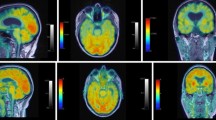Abstract
Frontotemporal dementia (FTD) is a clinical term that encompasses a spectrum of disorders that affect predominantly language and behavior to varying degrees. Progressive nonfluent aphasia (PNFA) affects mainly language output, semantic dementia (SD) affects mainly language comprehension, and behavioral variant FTD (bv-FTD) affects mainly behavior. FTD is the most common form of young onset dementia. In this chapter, the main clinical, neuropsychological, radiological, and biomarker characteristics are described. Treatment is largely symptomatic but progress in the pathological, molecular, and genetic classification of FTD continues to burgeon, leading to exciting possibilities for disease modification.
Access this chapter
Tax calculation will be finalised at checkout
Purchases are for personal use only
Similar content being viewed by others
Further Reading
Cairns NJ, Bigio EH, Mackenzie IR, et al; Consortium for Frontotemporal Lobar Degeneration. Neuropathologic diagnostic and nosologic criteria for Frontotemporal lobar degeneration: consensus of the consortium for Frontotemporal Lobar Degeneration. Acto Neuropathol 2007; 114(1):5–22. Epub 2008 June 20.
Cummings JL. Frontal-subcortical circuits and human behaviour. Arch Neurol 1993; 50:873–80.
Gorno-Tempini ML, Hillis AE, Weintraub S, et al. Classification of primary progressive aphasia and its variants. Neurology 2011 76:1006–1014.
Hodges, JR, ed. Frontotemporal Dementia Syndromes. Cambridge: Cambridge University Press; 2007.
McKhann GM, Albert MS, Grossman M, et al. Clinical and pathological diagnosis of Frontotemporal dementia. Arch Neurol 2001; 58:1803–09.
Neary D, Snowden JS, Gustafson L, et al. Frontotemporal lobar degeneration. A consensus on clinical diagnostic criteria. Neurology 1998; 51:1546–54.
Piguet O, Hornberger M, Shelley BP, et al. Sensitivity of current criteria for the diagnosis of behavioural variant frontotemporal dementia. Neurology 2009; 72:732–737.
Vossel KA, Miller BL. New approaches to the treatment of Frontotemporal Lobar Degeneration. Cur Opin Neuol 2008 December; 21(6):708–716.
Weintraub S, Mesulam M. With or without FUS, it is the anatomy that dictates the dementia phenotype. Brain 2009; 132: 2906–2908.
Author information
Authors and Affiliations
Corresponding author
Editor information
Editors and Affiliations
Rights and permissions
Copyright information
© 2011 Springer-Verlag London Limited
About this chapter
Cite this chapter
Doherty, C.P., Hutchinson, S., Abrahams, S., Coen, R.F. (2011). Frontotemporal Dementia. In: Hardiman, O., Doherty, C. (eds) Neurodegenerative Disorders. Springer, London. https://doi.org/10.1007/978-1-84996-011-3_6
Download citation
DOI: https://doi.org/10.1007/978-1-84996-011-3_6
Published:
Publisher Name: Springer, London
Print ISBN: 978-1-84996-010-6
Online ISBN: 978-1-84996-011-3
eBook Packages: MedicineMedicine (R0)




